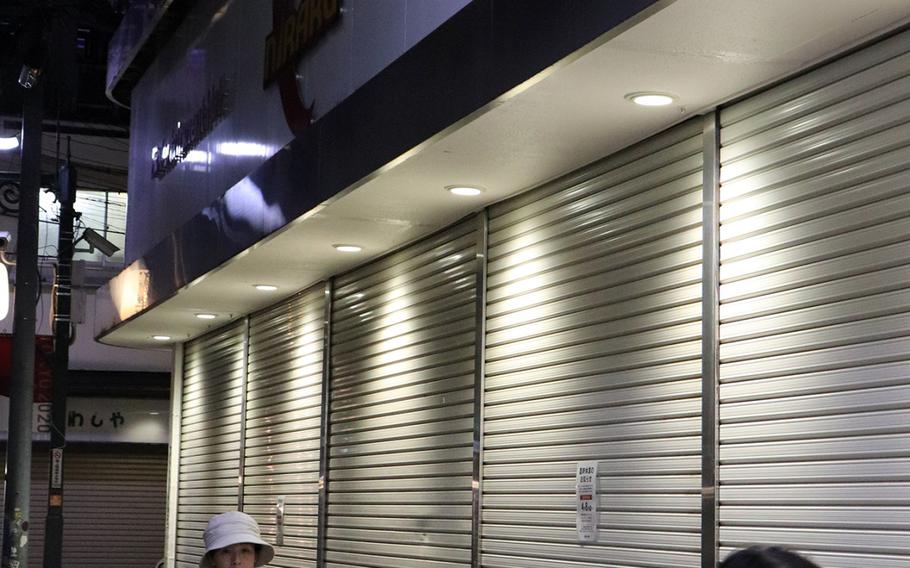
Pedestrians stroll past a shuttered pachinko parlor in the Nakano section of Tokyo, Sunday, May 3, 2020. (Nao Okochi//For Stars and Stripes)
Stars and Stripes is making stories on the coronavirus pandemic available free of charge. See other free reports here. Sign up for our daily coronavirus newsletter here. Please support our journalism with a subscription.
TOKYO — Japanese Prime Minister Shinzo Abe on Monday said a nationwide state of emergency aimed at curbing the coronavirus’ spread will remain in place through May 31.
The measure, originally slated to end Wednesday, includes requests that some businesses temporarily close and that people work from home as much as possible.
Speaking during a Novel Coronavirus Response Headquarters meeting, Abe said that although the coronavirus has not spread explosively in Japan compared to other countries, the number of new cases has not declined as the government had hoped and that hospitals remain inundated with new patients.
Abe said he plans to ask an expert panel to look over the number of new cases and the state of medical facilities by May 14 to evaluate whether lifting restrictions in some areas is possible before the month ends.
U.S. Forces Japan, on the other hand, has no plans to extend or rescind its own public health emergency scheduled to expire May 15, spokesman Col. Robert Firman said Monday in an email.
USFJ is watching what transpires this week before considering an extension of Lt. Gen. Kevin Schneider’s order, which allows commanders to restrict the movements and activities, not only of troops, but also civilian employees, family members, retirees, contractors and local nationals with access to the facilities.
“We’re all very interested to see how the numbers change after Golden Week,” Firman said, referring to a series of public Japanese holidays that end Wednesday.
Schneider initially declared the public health emergency for all U.S. military bases in and around the Tokyo metro area on April 6. He extended that measure to all U.S. installations in Japan on April 15.
Japan counted 15,057 cases of coronavirus and 510 deaths as of noon Monday, according to the Ministry of Health, Labour and Welfare. The infections peaked with 784 on April 12 and have since gradually declined, according to the World Health Organization website.
The number of ambulance patients rejected last month by Japanese hospitals saw a fivefold increase compared to the number turned away in April 2019, according to a Kyodo News survey reported Monday. The most commonly cited reason for the rejections was that patients were suspected of having the coronavirus.
The report said the survey “underscores how the virus is also affecting the state of emergency care, with medical facilities increasingly wary of in-hospital infections due to COVID-19,” the respiratory disease caused by the novel coronavirus.
Kyodo also reported that Japan may allow parks, museums, libraries and other public facilities to start operating again, even in areas with high infection cases. Nishimura told reporters Sunday that the government will allow the facilities to reopen if sufficient measures are taken to prevent the virus’ spread.
Stars and Stripes reporter Seth Robson contributed to this report.
kusumoto.hana@stripes.com Twitter: @HanaKusumoto